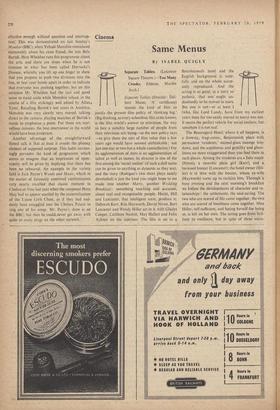Cinema
Same Menus
By ISABEL QUIGLY Separate Tables. (Leicester Square Theatre.)—Too Many Crooks. (Odeon, Marble Arch.) Separate Tables (director : Del- bert Mann; 'A' certificate) sounds the kind of film to justify he present film policy of 'thinking big.' (Big thinking, as every schoolboy film.critic knows, is the film world's answer to television, the way to lure a suitably large number of people from their television sets being—so the new policy says —to give them the sort .of film value that a few years ago would have seemed unthinkable : not just one star or two but a whole constellation.) For its agglomeration of stars is an agglomeration of talent as well as names, its director is one of the first among the 'social realists' (if such a dull name can be given to anything as dynamic as they are), and the story (Rattigan's two short plays neatly dovetailed) is just ihe kind you might hope to see made into another . Marty, another Wedding Breakfast: something touching and accurate, about real and recognisable people. Hecht, Hill and Lancaster, that intelligent team; produce it; Deborah Kerr, Rita Hayworth, David Niven, Burt Lancaster and Wendy Hiller act in it, with Gladys Cooper, Cathleen Nesbitt, May Hallatt and Felix Aylmer on the sidelines. The film is set in a Bournemouth hotel and the English background is taste- fully and on the whole accur- ately reproduced. And the acting is so good, in a story so pathetic, that one ought un- doubtedly to be moved to tears.
But one is not—or at least I (who, like Lord Lundy, have from my earliest years been far too easily moved to tears) was not It seems the perfect vehicle for social realism; but somehow it is not real.
The Beauregard Hotel, where it all happens, is a frowsty, tragi-comic, Betjemanish place with permanent 'residents,' stained-glass lozenge win- dows, and the aspidistras and gentility and ghast liness no more exaggerated than you find them in such places. Among the residents are a fake major (Niven), a neurotic plain girl (Kerr), and a harassed boozer (Lancaster); the hotel owner (Hil- ler) is in love with the boozer, whose ex-wife (Hayworth) turns up to reclaim him. Through 'a busy evening and the next morning's breakfast we follow' the developnients of character and re- lationships : the settlements, the soul-saving. The two who are scared of life come together; the.two who are scared of loneliness come together. Miss Hiller, self-sufficient, and hating herself for being so, is left on her own. The acting goes from bril- liant to mediocre; but in spite of three extra- ordinarily good performances (Niven, Kerr, Hil- ler), only Miss Hiller manages to convince one she exists, has a life before the film opened and goes on with one after it ends. The phoney major and the Mummy-crushed spinster, each furtively attracted to the other's pathos, are Oscarish per- formances: dazzling, freakish, unexpected. But somehow (and the fault is basic, Mr. Rattigan's) they fail, for all their agonies, to come agonisingly alive. Only Miss Hiller, her film self satisfactorily in tune with her own personality, blazes through a commonplace part to make one believe in her rather incredible renunciation, and the pain of living on beyond it.
The second hopeless pair is played by Burt Lancaster and Rita Hayworth: has-beens this time; he, a failed writer, low in morale, lost, lonely; she, an ageing beauty, after a troop of hus- bands at last alone and terrified of the future. Neither is convincing, for neither gives the air of being a lonely has-been: both are only too obviously in their prime, on top of things, alto- gether far too competent and tough for failure and self-pity. Miss Hayworth, quite simply, doesn't look ageing enough, and the director is never ruthless enough to remove her glamour. At one moment Burt Lancaster holds her face under a strong light and remarks on the crow's-feet, the wrinkles; but we are never shown them. (The same thing happened in A Streetcar named Desire and we did see them : an awful but necessary moment.) The same softness where toughness is needed runs through all the direction of this sympathetic but stagy and always slightly remote and incredible film. Why are they all in this state of suspended animation, for one thing? What happened be- fore? What happens after? The point about `slice of life' films is that you must be able to imagine what comes on either side of the slice. Here we have just the slice—beautifully cut, iced, and decorated, thick with-plums and nothing in it but the finest ingredients; tasty, tidy, but unsatisfying : a pity, because, as the Hatter kept remarking, it is the best butter.
Too Many Crooks (director : Mario Zampi; certificate): British comedy that starts promis- ingly and soon fades into school charades on a wet Sunday; with George Cole, Bernard Bresslaw and Sidney James as an incompetent gang, Terry- Thomas as the villain they fleece, and Brenda de Banzie as the villain's wife and more successful fleeter.



































 Previous page
Previous page